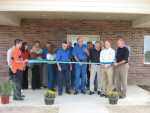Prairie Pride, Inc. soybean oil, biodiesel plant ready to roll

DEERFIELD, Mo. -- Prairie Pride, Inc., a combination soybean oil extraction-biodiesel refining facility near Deerfield, Mo., is tentatively scheduled to begin operations in early October, company officials said Tuesday.
The company, which is already marketing its products, is a new generation producer cooperative that requires a producer to be a member in order to sell to the plant. Co-op members will share in the profit of the operation. The 210-acre state-of-the-art production facility is located about nine miles west of Nevada, just south of U.S. Highway 54, near Deerfield. The actual plant occupies about six acres.
Producers in Bourbon County, Vernon County, Mo., and other surrounding counties will benefit from the plant, which will crush about 21 million bushels of soybeans each year to extract the soy oil, which will then be refined into about 30 million gallons of biodiesel fuel. The company will receive a percentage of the profits for every gallon of biodiesel sold, officials said.
Biodiesel is a non-toxic, biodegradable, renewable fuel that can be made from soybean oil by refining out the glycerin.
The company's primary product will be soybean meal, while biodiesel fuel will be one of the company's byproducts, company general manager John Nelson said during a Fort Scott Area Chamber of Commerce-sponsored ribbon-cutting ceremony for the business Tuesday at the plant.
The plant will benefit all types of producers within a 100-mile radius, Nelson said. Producers who share in the cooperative and ownership of the company hail from five or six nearby states as well, he said.
"There's been a good response from farmers in the area," Nelson said.
The plant is expected to generate more than $250 million in gross income annually and employs between 35 and 40 people directly, while also creating an additional 1,300 independent jobs, company officials said. Construction of the $80 million facility created several hundred construction jobs and 1,000 construction-related jobs.
FSACC Business Development Division Chairman Bryan Holt helped welcome company officials into the business community on Tuesday.
"The business will impact so many in the community," Holt said. "In this day and age when we're constantly trying to find ways to reduce our dependency on foreign sources of oil, Prairie Pride is helping us do that. We applaud you for that effort."
Prairie Pride, Inc. Chairman of the Board Marvin Oerke said the idea for the project started about five years ago when a group of soybean producers got together to come up with a way to add value to their product. Company officials started working seriously on the project in January 2005, and the plant opened its doors last year after construction on the plant was completed.
"A couple of years ago, we came up with this idea," Oerke said Tuesday. "At that early stage, we wanted to form a new generation cooperative. It's kind of a dream come true. We're really proud of our facility."
Oerke said there are now 1,050 producers who have invested money in the plant, which will benefit all producers, not just soybean farmers.
The average investment per producer is about $36,000, company officials said.
"There's a lot of commitment," Oerke said.
Oerke said he believes the facility will become the cleanest soybean refining plant in the world, because of its high-quality assurance program and high-quality products that undergo an extensive amount of testing before they are sold.
The plant has enough soybeans within a 7,500-mile radius to help drive the business' operations, company commodity manager Kent Engelbrecht said. One of the plant's primary purposes is to allow area producers a way to market their product without having to spend a lot of money on the freight costs of shipping it to a larger city that is farther away, company officials said.
The plant site's location between the Kansas City Southern and Missouri and North Arkansas Railroad tracks is also beneficial to area producers. The three nearby highways, rail transportation, and the availability of natural gas and electricity were important factors in the decision to build the plant at its current location, officials said.
The plant will eventually be open 24 hours a day, seven days a week.
